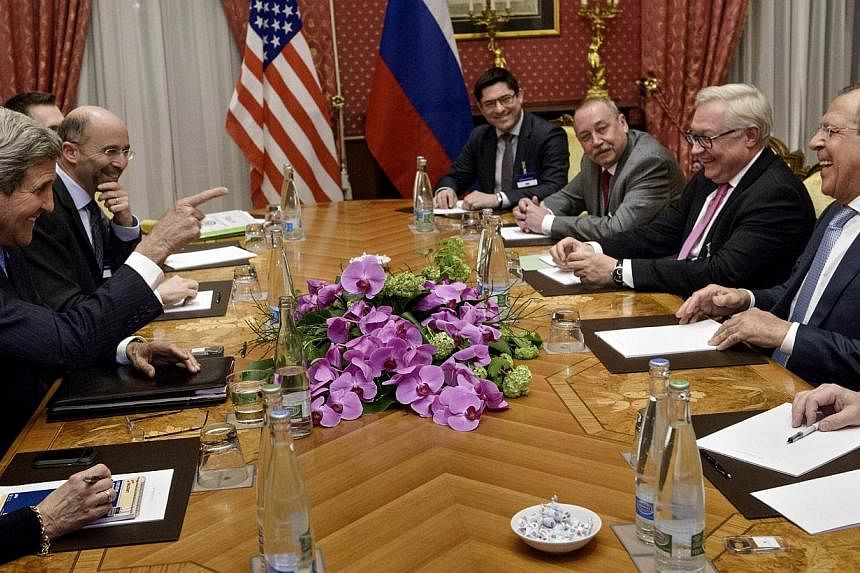An accord on Iran's nuclear program was finally reached on April 2 after two years of negotiations, capped by eight tumultuous days and nights of talks that appeared on the brink of breakdown several times.
The accord agreed by Iran and six world powers - the United States, Britain, France, Germany, Russia and China - placed limits on Tehran's nuclear program for the next 15 years. Its key aim is to reduce Iran's existing stockpile of nuclear fuel and its capacity to produce new fuel to a level that would ensure it would take at least a year for Iran to manufacture enough fuel for an atomic weapon if it chose to violate the accord.
Here's what you should know about the nuclear deal:
What are some terms of agreement?
1. Iran can keep its nuclear facilities, which it insists are for civilian uses only, but they would be subject to strict production limits. Two facilities will be converted into research sites without fissile material.
2. It has to cut the number of its centrifuges, which are used to enrich uranium, by two-thirds to 5,060, and reduces its stockpile of low-enriched uranium from 10,000 kg to 300 kg - not enough for a nuclear weapon - for 15 years. Thousands of centrifuges will be put into storage.
3. Tehran is to redesign a heavy-water reactor at Arak in a way that would keep it from producing plutonium, a weapons-usable fuel
4. It gets relief from a range of international sanctions that have sharply reduced its sale of oil and impeded access to the international financial system
What are the outstanding issues?
1. Iran wants all sanctions removed quickly but the United States says sanctions would be removed in stages after Iran shows compliance with the terms of a final nuclear agreement targeted by June 30. American sanctions related to terrorism, human rights abuses and non-nuclear weapons will remain in place.
2. Details of how Iran's existing stockpile of nuclear fuel would be diluted, neutralised or removed from the country still need to be worked out in the coming months.
3. The US wants all nuclear facilities in Iran, including military bases, to be subject to inspections that could "investigate suspicious sites or allegations of a covert enrichment facility."
4. The process for ensuring Iran remains in compliance with the terms of the agreement and the process for reimposing sanctions if it is found to fall out of compliance.
What do supporters say?
US President Barack Obama welcomed the "historic understanding" with the Islamic republic after decades of hostility, saying the deal "cuts off every pathway" for Iran to develop a nuclear weapon and establishes the most intrusive inspection system in history". "If Iran cheats," he said, "the world will know it."
French President Francois Hollande welcomed the framework but said France must remain "watchful" to ensure a final agreement prevents Iran from having access to nuclear arms, a comment echoed by British Foreign Secretary Philip Hammond. Russia said the agreement would have a positive impact on the security situation in the Middle East, with Iran being able to take more active part in solving problems and conflicts.
What do the Iranians say?
Iran's President Hassan Rouhani said the nuclear deal will open a "new page' for the country's international relations and lead to "constructive interaction". He added that a final agreement would depend on both sides living up to their commitments. "If the other side honours its promises, we will honour our promises," he said.
In Iran where there was huge demand for an end to Western sanctions on the oil and banking sectors, hundreds of Iranians took to the streets of Tehran in celebration after the agreement was announced, with drivers sounding their horns in approval along the capital's longest street, Val-e-Asr Avenue.
What do opponents say?
Israeli Prime Minister Benjamin Netanyahu, who has been a staunch critic of the negotiations, said: "The proposed agreement would constitute a real danger to the region and the world, and it would threaten the existence of Israel." An official close to his office went even further, saying the framework agreement "kowtows to Iranian dictates."
Other opponents said a one-year breakout time is insufficient, giving the US and its allies too little time to react if Iran does race to build a nuclear weapon. They also raised concerns that no matter what access Iran gives inspectors from the International Atomic Energy Agency, they could still attempt to build a weapon without inspectors or US intelligence finding out. "We are all concerned that the Iranians will circumvent the deal," said Israeli politician Yair Lapid.
In the US, Mr Obama will have to convince a skeptical Congress, where Republicans and many Democrats are concerned that he has grown so desperate to reach a deal that he is trading away American and Israeli security. The White House opposed the interference from Congress and said it would veto such a bill. "If Congress kills this deal, not based on expert analysis, and without offering any reasonable alternative, then it's the United States that will be blamed for the failure of diplomacy, international unity will collapse, and the path to conflict will widen," Mr Obama said.
What's the next step?
Negotiators have to produce a framework for a comprehensive agreement that parties say they intend to draft by June 30. If that final deal is reached and signed, it will be the most significant accord between Iran and major world powers since its Islamic revolution in 1979.
SOURCE: NEW YORK TIMES, TIME, AGENCE FRANCE-PRESSE

